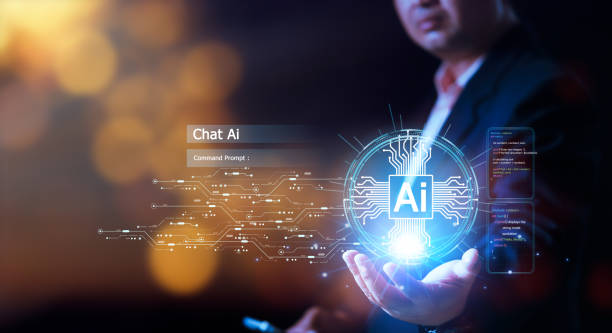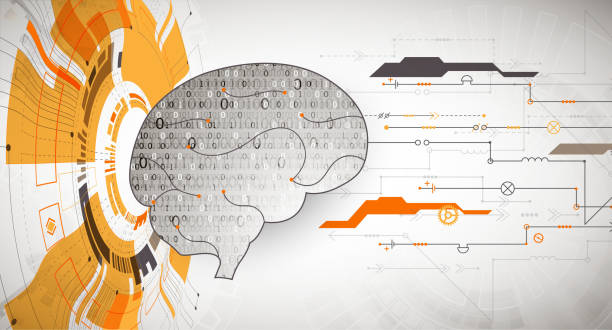What is Artificial Intelligence? Definition, History, and Key Concepts

#Artificial_Intelligence (Artificial Intelligence) is a branch of computer science that deals with building machines capable of performing tasks that typically require human intelligence.
These tasks include learning, reasoning, problem-solving, perception, and natural language.
Artificial Intelligence is not just a single technology, but a collection of different approaches and techniques whose common goal is to create intelligent machines.
The history of artificial intelligence dates back to the 1950s, when researchers like Alan Turing and John McCarthy introduced initial ideas in this field.
Turing, with his “Turing Test,” sought to measure machines’ ability to mimic human intelligence.
McCarthy also coined the term “Artificial Intelligence” and organized a conference in Dartmouth, which is considered a turning point in the history of this field.
In subsequent decades, artificial intelligence faced many ups and downs.
Periods of rapid and exciting progress were accompanied by periods of disappointment and reduced funding.
However, in recent decades, significant advancements in fields such as machine learning, deep neural networks, and natural language processing have made artificial intelligence one of the most important and widely used technologies today.
Key Concepts in Artificial Intelligence include:
- Machine Learning the ability of a system to learn from data without explicit programming
- Neural Networks Computational models inspired by the structure of the human brain.
- Natural Language Processing The ability of machines to understand and generate human language.
- Reasoning The ability of machines to draw logical conclusions.
- Problem Solving The ability of machines to find solutions to complex problems.
Artificial Intelligence currently has applications in many fields, including:
- Automotive Self-driving cars
- Medicine Disease diagnosis, drug development
- Finance Fraud detection, risk management
- Marketing Ad personalization, customer behavior analysis
- Education Intelligent tutoring systems
Does your current e-commerce website design not generate the expected sales for you?
Rasaweb is an expert in professional e-commerce website design!
✅ An attractive and user-friendly website aimed at increasing sales
✅ High speed and security for an ideal shopping experience⚡ Get a free consultation for online store design with Rasaweb!
Types of Artificial Intelligence by Capability and Application

Artificial intelligence can be categorized into different types based on its capability and application.
One of the most common classifications divides AI into the following three categories:
- Weak AI or Narrow AI This type of AI is only capable of performing a specific task and performs human-like functions within that task.
Most AI systems used today are of this type.
Examples of weak AI include facial recognition systems, machine translation systems, and voice assistants like Siri and Alexa. - Strong AI or General AI This type of AI possesses cognitive abilities similar to humans and can perform any task that a human can.
Strong AI is still a theoretical concept and has not yet been fully realized. - Super AI This type of AI surpasses human intelligence and can outperform humans in every field.
Super AI is also still a theoretical concept, and there are concerns about its potential consequences.
In addition to this classification, AI can also be divided into various types based on its application.
Some common applications of AI include:
- Machine Learning Creating systems that can learn from data and improve their performance without explicit programming.
- Natural Language Processing Creating systems that can understand and generate human language.
- Computer Vision Creating systems that can process and interpret images and videos.
- Robotics Designing and building robots that can perform various tasks.
- Expert Systems Creating systems that can simulate the knowledge and experience of human experts.
Each of these applications has various sub-branches and is used in diverse fields.
For example, machine learning is used in fraud detection, market prediction, and drug development, while natural language processing is used in machine translation, sentiment analysis, and question answering.
Machine Learning and its Role in Artificial Intelligence

Machine Learning is one of the most important and widely used sub-branches of Artificial Intelligence.
Machine learning enables machines to learn from data and improve their performance without explicit programming.
In other words, machines use machine learning algorithms to identify patterns and relationships within data and then use these patterns for prediction, decision-making, and problem-solving.
There are different types of machine learning algorithms, including:
- Supervised Learning In this type of learning, the machine is trained using labeled data.
Labeled data includes the desired input and output for each input.
Using this data, the machine learns a model that can predict the desired output for new inputs.
Examples of supervised learning include regression and classification. - Unsupervised Learning In this type of learning, the machine is trained using unlabeled data.
The machine must automatically identify patterns and structures within the data.
Examples of unsupervised learning include clustering and dimensionality reduction. - Reinforcement Learning In this type of learning, the machine is trained through trial and error.
The machine is placed in a specific environment and receives rewards or penalties for performing different actions.
Using these rewards and penalties, the machine learns which actions to take to maximize its reward.
Machine learning has applications in many fields, including:
- Fraud Detection Identifying fraudulent transactions in financial systems.
- Market Prediction Predicting the prices of stocks and other financial assets.
- Drug Development Identifying new drug compounds and optimizing drug formulations.
- Disease Diagnosis Diagnosing diseases from medical images and other clinical data.
- Self-driving Cars Controlling vehicles without human intervention.
Recent advancements in machine learning, especially in the field of deep neural networks, have made artificial intelligence one of the most important and widely used technologies today.
Deep neural networks are complex computational models inspired by the structure of the human brain.
These networks can identify complex patterns and relationships within data and deliver excellent performance in areas such as image recognition, natural language processing, and machine translation.
| Machine Learning Algorithm | Learning Type | Application |
|---|---|---|
| Linear Regression | Supervised | Price Prediction |
| Decision Tree | Supervised | Customer Classification |
| K-means Clustering | Unsupervised | Market Segmentation |
What is Deep Learning and How Does It Work?

Deep Learning is a subset of machine learning that uses neural networks with many (deep) layers to analyze data.
These networks are inspired by the structure of the human brain and are composed of artificial neurons that are interconnected.
Each neuron has an activation function that processes the input and produces an output.
This output is then passed as input to the neurons in the next layer.
The main difference between traditional neural networks and deep neural networks lies in the number of layers.
Traditional neural networks usually have one or two hidden layers, while deep neural networks can have tens or even hundreds of hidden layers.
These numerous layers enable deep neural networks to identify complex patterns and relationships within data.
Deep neural networks have applications in many fields, including:
- Image Recognition Detecting objects, faces, and scenes in images.
- Natural Language Processing Machine translation, sentiment analysis, and question answering.
- Speech Recognition Converting speech to text.
- Gaming Playing complex games like Go and StarCraft.
- Self-driving Cars Controlling vehicles without human intervention.
One of the most important reasons for the success of deep neural networks is access to large volumes of data.
Deep neural networks require large amounts of data for training.
Fortunately, in recent years, the volume of available data has significantly increased.
This increase in data volume has enabled the training of high-performance deep neural networks.
Furthermore, hardware advancements have also played a crucial role in the success of deep neural networks.
Graphics Processing Units (GPUs) are specifically designed for parallel computations and can train deep neural networks much faster than Central Processing Units (CPUs).
Despite significant advancements, deep neural networks still face challenges.
One such challenge is interpretability.
Understanding how deep neural networks work and why they make certain decisions is difficult.
This limits the use of deep neural networks in fields that require high transparency and reliability, such as medicine and law.
Does your current company website convert visitors into customers, or does it drive them away? Solve this problem forever with professional corporate website design by Rasaweb!
✅ Build credibility and powerful branding
✅ Attract target customers and increase sales
⚡ Get a free consultation now!
Natural Language Processing (NLP) and its Applications in Today’s World

Natural Language Processing (NLP) is a branch of Artificial Intelligence that deals with the interaction between computers and human languages.
The goal of NLP is to enable computers to understand, interpret, and generate human language.
This includes the ability to read, write, speak, and understand human language in a way that is natural and meaningful to humans.
The applications of NLP are vast and diverse, present in many aspects of our lives.
Some common applications of NLP include:
- Machine Translation Translating text from one language to another.
- Sentiment Analysis Detecting emotions in text, such as positive, negative, or neutral.
- Text Summarization Summarizing long texts into shorter, more useful ones.
- Question Answering Answering questions posed in natural language.
- Chatbots Creating conversational systems that can interact with users.
- Spam Detection Identifying spam emails and messages.
- Information Retrieval Finding necessary information amidst large volumes of text data.
NLP uses various techniques to process human language, including:
- Syntactic Analysis Analyzing the grammatical structure of sentences.
- Semantic Analysis Understanding the meaning of words and sentences.
- Pragmatic Analysis Understanding the purpose and intent of the speaker or writer.
Recent advancements in machine learning, especially in the field of deep neural networks, have made NLP one of the most important and widely used technologies today.
Deep neural networks can identify complex patterns and relationships present in human language and deliver excellent performance in fields such as machine translation, sentiment analysis, and question answering.
Despite significant advancements, NLP still faces challenges.
One such challenge is ambiguity in human language.
Words and sentences can have different meanings, and understanding their precise meaning depends on context and circumstances.
This makes natural language processing difficult.
Applications of Artificial Intelligence in Various Industries: From Medicine to Finance

Artificial intelligence currently has applications in various industries and holds high potential for transforming them.
In this section, we will explore some applications of artificial intelligence in different industries:
- Medicine AI is used in disease diagnosis, drug development, personalized treatment, and improving patient care.
AI systems can analyze medical images and diagnose diseases with greater accuracy.
Additionally, AI can play a role in identifying new drug compounds and optimizing drug formulations. - Finance AI is used in fraud detection, risk management, market prediction, and providing personalized financial services.
AI systems can identify fraudulent transactions and prevent financial losses.
Additionally, AI can play a role in predicting stock prices and other financial assets. - Manufacturing AI is used in optimizing production processes, quality control, predicting machine failures, and robotics.
AI systems can optimize production processes and reduce costs.
Additionally, AI can play a role in product quality control and predicting machine failures. - Retail AI is used in personalizing the customer shopping experience, product recommendations, inventory management, and demand forecasting.
AI systems can analyze customer behavior and recommend suitable products to them.
Additionally, AI can play a role in inventory management and demand forecasting. - Transportation AI is used in self-driving cars, route optimization, traffic management, and delay prediction.
Self-driving cars use AI to perceive their surroundings and control the vehicle.
Additionally, AI can play a role in route optimization and traffic management.
These are just a few examples of AI applications in various industries.
With technological advancements, it is expected that AI applications will expand across different industries, and AI will play a more significant role in our lives.
Challenges and Concerns Related to the Development of Artificial Intelligence

The development of artificial intelligence is accompanied by numerous challenges and concerns.
Some of these challenges and concerns include:
- Ethical Issues AI can be used for unethical purposes, such as creating autonomous weapons or surveillance systems that violate individuals’ privacy.
- Job Displacement AI can lead to job losses in some industries, as machines can perform many tasks better and more cheaply than humans.
- Bias AI systems can be biased if trained on biased data.
For example, a facial recognition system may perform poorly in recognizing faces of individuals with darker skin tones. - Security AI systems can be targeted by cyberattacks and exploited.
For example, a self-driving car could be hacked and used for malicious purposes. - Control With the advancement of AI, there is a concern that control over AI systems may slip from human hands, and AI could become a threat to humanity.
To address these challenges and concerns, it is necessary to:
- Develop ethical standards for the development and use of AI.
- Invest in education and skill training to prepare the workforce for changes brought about by AI.
- Formulate laws and regulations to prevent the misuse of AI.
- Invest in research and development in AI security and AI control methods.
| Challenge | Description |
|---|---|
| Ethical Issues | Using AI for unethical purposes |
| Job Displacement | Replacing humans with machines |
| Bias | Creating discriminatory systems |
| Security | Cyberattacks and exploitation |
The Future of Artificial Intelligence and its Impact on Our Lives

The future of Artificial Intelligence appears very bright.
With technological advancements, it is expected that AI will play a more significant role in our lives and transform many aspects of it.
Some potential impacts of AI on our lives include:
- Improved Health AI can play a role in disease diagnosis, drug development, personalized treatment, and improving patient care.
- Increased Productivity AI can play a role in optimizing production processes, reducing costs, and increasing efficiency.
- Creation of New Jobs AI can lead to the creation of new jobs in fields such as AI development, data engineering, and data analysis.
- Improved Quality of Life AI can play a role in improving individuals’ quality of life, for example, by providing personalized services, automating daily tasks, and enhancing access to information.
However, to fully benefit from AI and prevent its potential risks, it is necessary to:
- Invest in education and skill training to prepare the workforce for changes brought about by AI.
- Develop ethical standards for the development and use of AI to prevent the misuse of this technology.
- Formulate appropriate laws and regulations for AI to protect individual rights and privacy.
- Encourage research and development in AI so that we can utilize the potential of this technology to solve societal problems.
With proper planning, we can use artificial intelligence to build a better future for everyone.
AI can help us cure diseases, increase productivity, create new jobs, and improve the quality of life.
Does your company’s website create a professional and lasting first impression in the minds of potential customers? Rasaweb, with its professional corporate website design, not only represents your brand’s credibility but also opens a path for your business growth.
✅ Create a powerful and reliable brand image
✅ Attract target customers and increase sales
⚡ Get a free consultation
How Can Artificial Intelligence Transform Your Business?

Artificial Intelligence can help businesses in various areas, including:
- Improve Customer Experience AI can help businesses provide personalized services, quickly answer customer questions, and improve customer satisfaction.
- Increase Sales AI can help businesses identify sales opportunities, predict demand, and optimize pricing.
- Reduce Costs AI can help businesses automate tasks, reduce errors, and improve efficiency.
- Improve Decision-Making AI can help businesses analyze data, identify patterns, and provide data-driven recommendations.
Some specific applications of AI in businesses include:
- Chatbots Providing 24/7 customer support services.
- Recommendation Systems Suggesting relevant products and services to customers.
- Fraud Detection Systems Identifying fraudulent transactions and preventing financial losses.
- Demand Forecasting Systems Predicting demand for products and services and optimizing inventory management.
- Marketing Automation Systems Automating marketing processes and improving advertising effectiveness.
For a business to benefit from AI, it is necessary to:
- Define its objectives and determine how AI can help achieve these goals.
- Collect sufficient data to train AI systems.
- Hire AI specialists or collaborate with an AI-specialized company.
- Continuously monitor and evaluate AI systems to ensure their correct performance.
Artificial intelligence has high potential for transforming businesses.
With proper planning and investment in this technology, businesses can benefit from AI and increase their competitiveness.
Familiarity with AI Development Tools and Platforms

For developing Artificial Intelligence systems, various tools and platforms exist, each with its own features and capabilities.
Some of these tools and platforms include:
- TensorFlow is an open-source machine learning library developed by Google.
TensorFlow is one of the most popular machine learning libraries in the world and is used for developing AI systems in various fields. - PyTorch is an open-source machine learning library developed by Facebook.
PyTorch is also one of the most popular machine learning libraries in the world and has attracted many researchers and developers due to its flexibility and ease of use. - Keras is a high-level API for building neural networks that can run on TensorFlow, PyTorch, or Theano.
Keras makes it easier for developers to use neural networks and allows them to quickly prototype AI systems. - Scikit-learn is a machine learning library for Python that includes various machine learning algorithms, model evaluation tools, and data pre-processing tools.
Scikit-learn is suitable for developing more traditional machine learning systems and is particularly useful for projects that do not require large amounts of data. - Google Cloud AI Platform is a cloud platform that provides various tools for developing and deploying AI systems.
Google Cloud AI Platform enables developers to easily train large-scale AI systems and deploy them in a cloud environment. - Amazon SageMaker is a cloud platform that provides various tools for developing and deploying AI systems.
Amazon SageMaker is similar to Google Cloud AI Platform and enables developers to easily train large-scale AI systems and deploy them in a cloud environment.
Choosing the right tool and platform for developing AI systems depends on various factors, including:
- Project Type Some tools and platforms are more suitable for specific projects.
- Developer Skills Some tools and platforms require specific skills.
- Budget Some tools and platforms are free, while others come with a cost.
By considering these factors, developers can choose the appropriate tool and platform for their project and effectively develop AI systems.
Frequently Asked Questions
| Question | Answer |
|---|---|
| What is Artificial Intelligence? | It is the simulation of human intelligence in machines programmed to think like humans and mimic their actions. |
| What are the main branches of Artificial Intelligence? | They include Machine Learning, Deep Learning, Natural Language Processing, Computer Vision, and Robotics. |
| What is Machine Learning? | It is a branch of Artificial Intelligence that focuses on enabling systems to learn from data and identify patterns without explicit programming. |
| Mention examples of AI applications in our daily lives. | Voice assistants (like Siri and Alexa), recommendation systems in Netflix and Amazon, self-driving cars, and facial recognition programs. |
| What is Deep Learning? | It is a subset of Machine Learning that uses multi-layered (deep) artificial neural networks to process large amounts of data. |
| What is Natural Language Processing (NLP)? | It is a branch of Artificial Intelligence that focuses on enabling computers to understand, interpret, and generate human language. |
| What are some ethical concerns related to Artificial Intelligence? | They include data bias, privacy, job loss, and accountability in case of errors. |
| What are the main benefits of Artificial Intelligence? | Increased efficiency, improved decision-making, automation of repetitive tasks, and discovery of complex patterns in data. |
| How is Artificial Intelligence used in healthcare? | In disease diagnosis, drug discovery, medical image analysis, and personalized patient care. |
| How do you see the future of Artificial Intelligence? | It is expected to continue evolving rapidly, impacting all aspects of human life, from industry to education and entertainment. |
And other services by Rasaweb Advertising Agency in the field of advertising
- Smart Advertising Campaign: An innovative service to enhance customer behavior analysis through precise audience targeting.
- Smart SEO: Revolutionize click-through rates with attractive UI design.
- Smart Sales Automation: Transform campaign management with Google Ads management.
- Smart Brand Identity: Designed for businesses seeking to attract customers through marketing automation.
- Smart Google Ads: Professional optimization to increase sales using intelligent data analysis.
And over a hundred other services in the field of internet advertising, advertising consulting, and organizational solutions
Internet Advertising | Advertising Strategy | Advertorial
Sources
Artificial Intelligence on Digiato
AI Articles on Zoomit
What is Artificial Intelligence? on Faradars
Artificial Intelligence on Wikipedia
? Transform your business in the digital world with Rasaweb Afarin. We pave your path to online success by providing comprehensive digital marketing services including multilingual website design, SEO, and social media management. For a free consultation and to learn more about our solutions, contact us today.
📍 Tehran, Mirdamad Street, next to Bank Markazi, Southern Kazeroon Alley, Ramin Alley, No. 6



